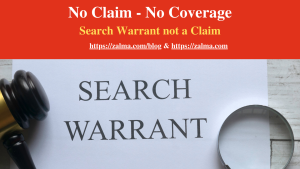No Claim – No Coverage

See the full video at https://rumble.com/v2qyf6a-no-claim-no-coverage.html and at https://youtu.be/u8V8_E8xkb0
In Brown Goldstein Levy LLP; Joshua Treem v. Federal Insurance Company, No. 22-1023, United States Court of Appeals, Fourth Circuit (May 18, 2023) the law firm of Brown Goldstein Levy LLP (“BGL”) and one of its partners, Joshua Treem, (collectively, “Appellants”) sued their insurer, Federal Insurance Company (“Appellee”), when it refused to provide coverage for costs Appellants incurred after the Government investigated Treem, executed a search warrant at BGL’s office, and notified Treem that his representation of certain clients may present a conflict of interest. The district court dismissed Appellants’ complaint, holding that there was no “Claim,” as that term is defined in the insurance policy, and alternatively that any costs Appellants incurred were excluded from the policy’s definition of “loss.”
FACTS
The Government began investigating attorney Kenneth Ravenell (“Ravenell”) in connection with a federal racketeering investigation. Ravenell engaged Treem and the firm to represent him in the investigation. The Government sent Treem a letter (the “Ravenell Conflict Letter”) informing him that he was “now a subject of the investigation and [his] conduct [was] within the scope of the grand jury’s investigation.”
On June 13, 2019, the Government obtained a search and seizure warrant for BGL’s offices, which it executed on June 18, 2019. In executing the warrant, the Government seized tens of thousands of documents, including “all of Treem’s emails, regardless of their relation to Ravenell or relevance to the ongoing investigation.” That same day, the Government sent Treem’s counsel a letter (the “Target Letter”) to advise that Treem was “a target of the ongoing criminal investigation and the Grand Jury has substantial evidence linking Mr. Treem to the commission of crimes.”
Appellants sought relief in the district court, arguing that the seizure was beyond the scope of the investigation into Treem and Ravenell, and further objected to the Government’s use of a “Filter Team” to inspect the documents seized for attorney client privilege. Appellants moved for a temporary restraining order and a preliminary injection and they prevailed at the Fourth Circuit. See In Re Search Warrant, 942 F.3d 159 (4th Cir. 2019). Appellants maintain that they incurred over $230,000 in defense costs related to the search warrant litigation.
THE INSURANCE
Appellants obtained a professional liability insurance policy from Federal covering claims made between November 21, 2018, and November 21, 2019 (the “Policy”).
The Policy defines a “Claim” as any of the following: “(a) a written demand or written request for monetary damages or non-monetary relief; (b) a written demand for arbitration; (c) a civil proceeding commenced by the service of a complaint or similar pleading; or (d) a formal civil administrative or civil regulatory proceeding (including a disciplinary or grievance proceeding before a court or bar association) commenced by the filing of a notice of charges or similar document or by the entry of a formal order of investigation or similar document against an Insured for a Wrongful Act, including any appeal therefrom.”
Appellants gave notice to Appellee of their intent to seek insurance coverage pursuant to the Policy for the losses incurred in the search warrant litigation (the “Search Warrant Claim”) and the defense costs associated with defending Treem in connection with the criminal investigation (the “Partner Claim).
THE LITIGATION
Federal sued asking the court to declare the parties’ rights and obligations pursuant to the Policy and seeking damages for breach of contract. The district court issued an order granting Appellee’s motion to dismiss. In doing so, the district court held that the Search Warrant Claim was not entitled to coverage pursuant to the Policy because it did not fall within the Policy’s definition of a “Claim,” and even if it did, the costs associated with the search warrant litigation do not constitute “defense costs” under the Policy.
ANALYSIS
Maryland courts only construe policies of insurance against the insurer when a policy term is “ambiguous.” A policy term is considered ambiguous if, to a reasonably prudent person, the term is susceptible to more than one meaning. If no ambiguity in the terms of the insurance contract exists, a court has no alternative but to enforce those terms.
The Government did not seek to redress any diminution of its legal rights, nor did it seek remedy for any harm brought upon it by Appellants The warrant application was not a demand or request for relief against the insured.
The search warrant itself is not a “Claim” because it is not a written demand or request. Neither the search warrant application nor the resulting search warrant are “written demand[s] or written request[s] for . . . nonmonetary relief . . . against an Insured” as required by the Policy. Therefore, the Search Warrant Claim fails because Appellants cannot state a claim for relief.
The Conflict Letters are not “Claims.” Despite Appellants’ attempts to characterize them as “demands,” they are not.
Lawyers liability insurance covers many actions against the insured lawyers but the policies do not cover everything. The conduct of the government against Brown Goldstein Levy LLP and Joshua Treem were egregious and resulted in the Fourth Circuit issuing a restraining order against the government. However, what the government did was not a claim nor were the actions of the insured against the government defense costs.
 (c) 2023 Barry Zalma & ClaimSchool, Inc.
(c) 2023 Barry Zalma & ClaimSchool, Inc.
Subscribe and receive videos limited to subscribers of Excellence in Claims Handling at locals.com https://zalmaoninsurance.locals.com/subscribe.
Consider subscribing to my publications at substack at https://barryzalma.substack.com/publish/post/107007808
Go to Newsbreak.com https://www.newsbreak.com/@c/1653419?s=01
Barry Zalma, Esq., CFE, is available at http://www.zalma.com and zalma@zalma.com
Follow me on LinkedIn: www.linkedin.com/comm/mynetwork/discovery-see-all?usecase=PEOPLE_FOLLOWS&followMember=barry-zalma-esq-cfe-a6b5257
Write to Mr. Zalma at zalma@zalma.com; http://www.zalma.com; http://zalma.com/blog; daily articles are published at https://zalma.substack.com. Go to the podcast Zalma On Insurance at https://podcasters.spotify.com/pod/show/barry-zalma/support; Follow Mr. Zalma on Twitter at https://twitter.com/bzalma; Go to Barry Zalma videos at Rumble.com at https://rumble.com/c/c-262921; Go to Barry Zalma on YouTube- https://www.youtube.com/channel/UCysiZklEtxZsSF9DfC0Expg; https://creators.newsbreak.com/home/content/post; Go to the Insurance Claims Library – https://zalma.com/blog/insurance-claims-library.
Like this:
Loading…
Related







